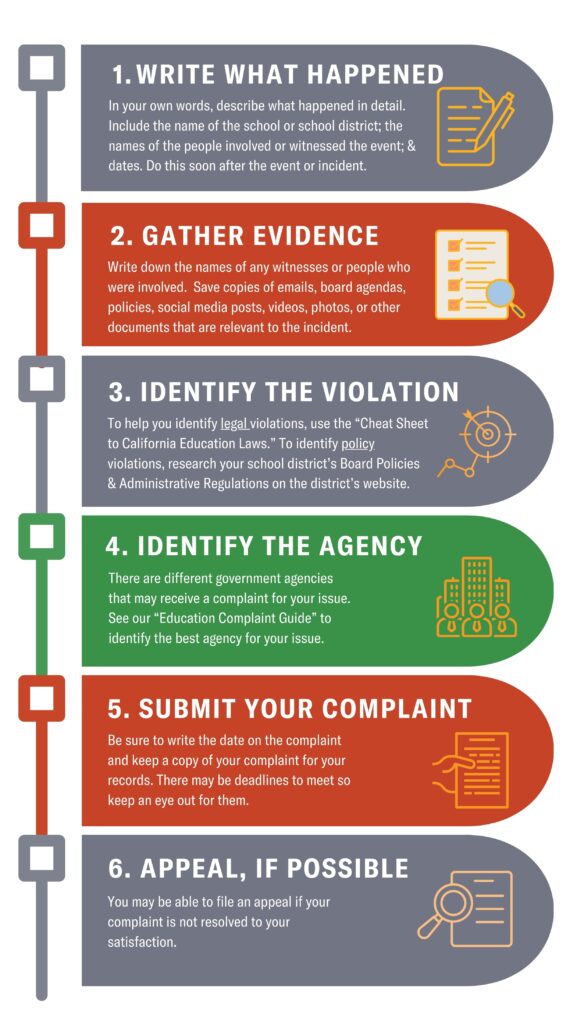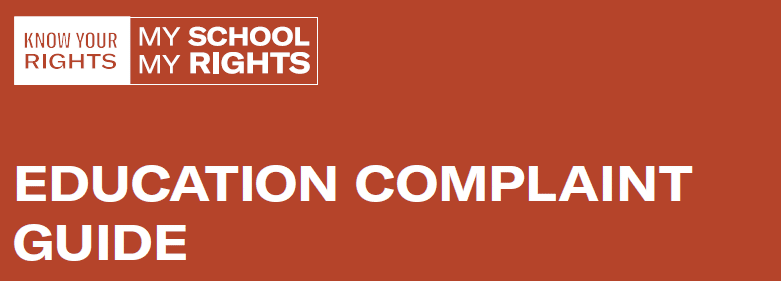Overview
In California, every young person should have the freedom to learn, be themselves, pursue their dreams, and get a good education that prepares them to succeed in life. But sometimes, things happen in schools that take away these freedoms, affecting some students more than others.
If you see problems at your school that stop or limit these rights, it can be useful to speak up and file a complaint. Filing a complaint can sometimes help make schools accountable for their actions. Sometimes, filing a complaint means a government agency can start an investigation into your school. This Education Complaint Guide will help you understand how California law protects students’ freedom to learn and be themselves, and it’ll show you how to file a complaint if your school isn’t following the rules.
If you want to learn more about students’ rights in California’s public schools, visit MySchoolMyRights.com.
How to File an Education-Related Complaint
If you want to file a complaint about an issue you are seeing at your school, here are some steps you can take to help you get ready to file a complaint.

Who Should I File a Complaint With?
Use this Education Complaint Guide to help you figure out whether your school or school district is potentially violating students’ right to freedom to learn and be their authentic selves. Below is a list of the different types of violations related to these freedoms, as well as options for filing complaints related to each type of violation.
Please be advised that the laws and complaint processes described in these charts are not exhaustive; in other words, the laws and complaint processes described in these charts may not cover all possible scenarios. This document is solely intended as an informational resource for students, families, and advocates. It does not constitute legal advice, nor does not create an attorney-client relationship. Different laws impose various deadlines, and failing to meet these deadlines may legally prevent you for pursuing your claims in court. If you believe your rights have been violated, please consult an attorney. Contacting the ACLU to describe your problem does not mean that the ACLU represents you and will not affect your deadlines.
| Issue | Accurate and Inclusive Curriculum |
|---|---|
| Examples of Potential Violations Related to this Issue | Failure to teach inclusive history, meaning history that includes Black, Indigenous, people of color, LGBTQ+ people, and people with disabilities Failure to teach inclusive sex education Failure of a school board to adopt or their removal of curricula materials (like schoolbooks) or library books because they include Black, Indigenous, or people of color and/or LGBTQ+ people |
| Your Complaint Options | OPTION 1: School District via the Uniform Complaint Procedures (UCP) Process Research your school district or charter school’s Uniform Complaint Procedures (UCP) process For information on the UCP process: Click Here FAQs for Parents and Guardians at Uniform Complaint Procedures – Complaint Procedures (CA Dept of Education) OPTION 2: Directly to the Superintendent of Public Instruction CA Department of Education’s Education Equity UCP Office: 916-319-8239 and [email protected] California Department of Education’s Office of Equal Opportunity, [email protected] |
| Issue | Insufficient Textbooks or Instructional Materials |
|---|---|
| Examples of Potential Violations Related to this Issue | Failure to provide enough textbooks for students to do their schoolwork Textbooks with damaged or missing pages, making it difficult for students to access crucial information |
| Your Complaint Options | OPTION 1: School Principal via a Williams complaint Research your school district or charter school’s Williams complaint process For information on Williams complaints: Click Here OPTION 2: Directly to the Superintendent of Public Instruction (only if insufficiency is related to school board’s action, or board’s failure to remedy the insufficiency). Email [email protected] |
| Issue | Brown Act / Open Government |
|---|---|
| Examples of Potential Violations Related to this Issue | Issues relating to transparency and accountability in public meetings and/or by public officials such as elected school board members or trustees. Examples: Favoring public comments of one viewpoint over another Voting on policy adoptions or other board action without following appropriate timeline |
| Your Complaint Options | OPTION 1: County District Attorney: Depends on your county. You can research your County District Attorney at https://www.cdaa.org/about-us/list-of-district-attorney-offices-by-county. OPTION 2: CA Department of Justice, Public Inquiry Unit: Call (916) 210-6276 or (Toll-free in California) (800) 952-5225 |
| Issue | Discrimination or Harassment on the Basis of a Protected Class |
|---|---|
| Examples of Potential Violations Related to this Issue | Protected classes are groups of people who share a particular characteristic that is protected from discrimination. These characteristics include, but are not limited to, disability, gender, gender identity, gender expression, nationality, race or ethnicity, religion, sexual orientation, and/or immigration status. Examples: A trans student being denied access to the restroom matching their gender identity Black students being disproportionately disciplined School districts adopting discriminatory policies that single out students based on their identity |
| Your Complaint Options | OPTION 1: For harms to individual students: Visit School District and/or CA Dept of Education via the Uniform Complaint Procedures (UCP) Process: Click Here OPTION 2: For harms to individual students and harms that impact several students the same way (aka systemic harm): Visit US Department of Education, Office for Civil Rights* (*See Important Note below): Click Here OPTION 3: For harms that impact several students the same way (aka systemic harm): Visit CA Department of Justice, Bureau of Children’s Justice (state level): Click Here OPTION 4: For harms that impact several students the same way (aka systemic harm): Visit US Department of Justice, Civil Rights Division, Educational Opportunities Section* (federal level) (*See Important Note below): Click Here |
*IMPORTANT NOTE:
The Department of Education’s (DOE) Office for Civil Rights (OCR) is a federal agency. While you may file a complaint with their office, it is important to carefully consider how current federal policy priorities may impact your complaint. As of January 2025, the federal administration has indicated that it intends to deprioritize and/or take a hostile approach to certain civil rights issues, and has begun rolling back previous measures to protect immigrant students and their families, LGBTQ+ students, and diversity, equity, and inclusion programs.
You should seriously consider what is the best forum for you to file your complaint. For example, if you are concerned about the federal administration’s approach to your problem, you may wish to instead file a complaint, such as a Uniform Complaint Procedures (UCP) complaint, with a state or local-level agency under California law.
Cheat Sheet to California Education Laws
Accurate and Inclusive Curriculum
| Education Code Section 51204.5 (FAIR Education Act) | This law requires inclusive social science/history instruction, including on the role and contributions of diverse communities (Native Americans, LGBTQ+ people, women, immigrants, persons with disabilities, etc.) |
| Education Code Section 60040 | This law requires school districts to adopt instructional materials that “accurately portray the cultural and racial diversity of our society” including Native Americans, LGBTQ+ people, women, immigrant populations, persons with disabilities, and more. |
| Education Code Sections 51930-51939 (CA Healthy Youth Act) | This law requires school districts to provide comprehensive and inclusive sexual health and HIV prevention education at least twice (once in middle school and once in high school). Instruction must be age-appropriate and inclusive of students of all backgrounds, including of all races, genders, and sexual orientations. |
| Education Code Section 243 | This law makes it illegal for a school district to refuse to adopt instructional materials that comply with Education Code sections 51204.5 and 60040. |
Insufficient Textbooks or Instructional Materials
| Education Code Section 60119 | This law requires school districts to ensure students have sufficient instructional materials (such as textbooks) aligned with content standards in math, science, history-social science, and English. |
Brown Act / Open and Transparent Government
| Government Code Sections 54950-54963 | These laws govern school board meetings, requiring them to be “open and public.” School boards must also provide agendas before board meetings and allow members of the public to address the board during designated public comment periods. |
Discrimination or Harassment on the Basis of a Protected Class
| Education Code Section 200–220 | These laws protect students from discrimination or harassment based on their actual or perceived race, sexual orientation, gender, gender identity, national origin, religion, immigration status, or other characteristics. They also require schools to affirmatively combat racism, sexism, and other forms of bias. |
